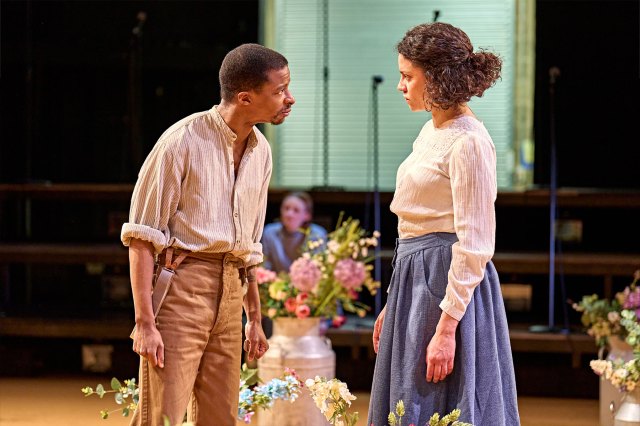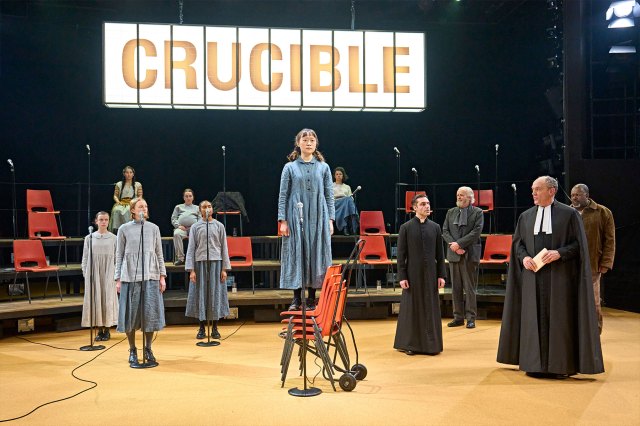The Crucible at Sheffield’s Crucible Theatre review – a tense and compelling revival, despite the gimmicks
Anthony Lau’s take on the Arthur Miller classic runs until 30 March

When first produced over 70 years ago, The Crucible was seen as shining a light on the hysteria and lies that engulf American society from time to time – in 1953, the McCarthy-ite anti-Communist witch-hunts. So today is, above all, a suitable time for another revival of a piece of continuing relevance.
The Salem witch trials of 1692 involved such immense numbers of people that, of necessity, Arthur Miller concentrated on the distortions, moral evasions, selfishness, uncertainties and conscience-driven certainty of a few.
Betty Parris, daughter of the village pastor, lies struck down in an inexplicable attack and from this, all else unravels. Parris has caught a group of girls dancing in the woods, playing at witches – dangerous sport in 17th century Salem! All the concealed enmities now surface: the dislike of such as John Proctor for Parris and the influential Thomas Putnam who wishes to serve Mammon as well as God; the hidden resentments that Ann Putnam, afflicted by the tragic early deaths of so many children, feels towards the good and rational Rebecca Nurse who has raised eleven; most dangerous of all, the venom that Abigail Williams, leader of the girls, unleashes towards John Proctor, her former employer whose wife turned her out after discovering their affair.
The third act (of four) is a magnificent chaotic trial scene in which the cool certainty of Deputy Governor Danforth uncovers his version of the truth whilst dismissing any inconvenient contradictions. Eventually, the play comes down to the consciences of two men: the Reverend Mr Hale who arrives from Beverly weighed down with the power of his books, but gradually finds them inadequate, and the flawed John Proctor who finally realises the importance of his reputation: “Because it is my name!”
Anthony Lau’s production cuts through these complications in a first act that dramatizes the Gothic horror of the scene and elevates confrontation over exposition. The effect is powerful, it must be said, with gospel hymns from serried ranks lined up at the back of the stage. Thereafter, the production from time to time irritates with unnecessary gimmicks, notably some pointless business with microphones, but always succeeds in ratcheting up the tension for the great climaxes. You wonder how far this is due to the cast-iron construction of the original, but certainly, the quality of some remarkable performances and Lau’s deployment of them count for much.
Most telling of all are the two girls at the centre of the plot. Rose Shalloo (Abigail) is not particularly strong vocally, but her physical presence is mesmeric, including where Lau employs her as a constant malevolent presence in the second act. Millicent Wong, as Mary Warren, Abigail’s successor as Proctor’s servant, is a heady mix of timidity and brashness, her expressions sometimes contradicting her words, though why she (among others) had to give evidence from atop a pile of chairs is a mystery.

Simon Manyonda is a forthright John Proctor, inhibited by a past sin, wrestling with his conscience, as, too, does Sid Sagar, rather insignificant at first as Hale, but gaining force as the play progresses. Anoushka Lucas is a troubled partner to John Proctor as his wife Elizabeth; Ian Drysdale’s certainty as Danforth becomes increasingly chilling as time passes; and Sargon Yelda betrays his self-interest in every word and action as Parris.
Notably shortened at less than three hours, The Crucible compels our attention and poses the still unanswerable question, “How do you refute a lie except by saying ‘It’s a lie.’?”
















